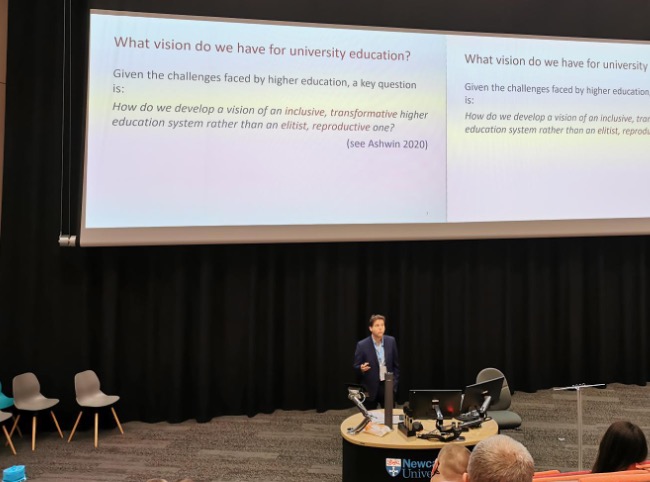The keynote at this year’s Learning and Teaching Conference at Newcastle University was Paul Ashwin, who is Professor of Higher Education at Lancaster University.

It was a good feeling being at a present-in-person conference and catching up with colleagues face-to-face for the first time since the start of the Pandemic. But would the keynote offer something inspiring and thought provoking? In my view – yes!
Paul Ashwin put forward the argument for an inclusive and transformative vision for H.E. vs. the status quo which is elitist and reproductive (of social inequalities). Current political drivers focus on the role of H.E. in developing employable students, but are predicated on a vision of H.E. which mistake social advantage with ability.
It would be hard to miss how much Newcastle University does to promote inclusivity, social justice, and contributing to the community (ok you can always do more!) – but there was still maybe some parts of Paul Ashwin’s keynote which made you reflect on what NU is as an institution and maybe a slight feeling of discomfort considering our position as an ‘advantaged’ Russel Group University. In particular, Paul talked about the ‘games’ H.E. play around Rankings and Generic Graduate Attributes. Paul’s research found that there was no relationship between educational quality and rankings. Few within in H.E. see the value of rankings and league tables, yet when we do well in them, ‘double-think’ (George Orwell) kicks in and we publicise them at every available opportunity! He didn’t mention what is probably the biggest ‘game’ of all in H.E. – the Research Excellence Framework! I guess, the issue is that regardless of whether you see and value in rankings, attributes, REF etc, as effective quality indicators – few H.E.I.s could afford not to play these ‘games’, given their impacts on student recruitment and funding.
Paul, gave a savaging critique of generic competencies – nearly all HEIs have adopted graduate attributes frameworks, but he argues these are often over-simplified and the focus on employability outcomes may distort how we measure quality in education. He spoke about creating a shopping list as an example of how almost any task can be shown to meet generic skills (time management, sustainability etc.). For me personally, that’s may be throwing out the baby with the bath water. True, if engaged with in a superficial manor, graduate attributes may have limited value. However, if meaningfully linked with the rich knowledge and capabilities developed at University (and other life-wide experiences), then they can have value; particularly as we need to build, recognise and continually develop transferable skills, in a world where our graduates will likely go on to have multiple careers.
The overall vision Paul put forward was one of inclusivity and the role of H.E. being custodians of knowledge and the role of teaching in making knowledge accessible to all. Our course and assessment designs need to provide exciting engagement with a structured body of knowledge. The backdrop to all this (perhaps ‘taken as read’ by the speaker) is the politics / government policy, including the impact of student fees and marketisation – and the view of the student purely as a “customer”. There are those who question why fees are so high, given that subject information is freely available on the Internet (making no distinction between information and knowledge). Also, there is a narrow focus on measuring employability outcomes and graduate incomes. Paul’s critique of this vision is that it strongly reinforces the reproductive role of H.E. in perpetuating social privilege. He was arguing that as a sector we need to invest time in the collective redesign of education for the more inclusive vison of H.E. which supports transformative learning, accessible by all.
Paul Ashwin provided a thought-provoking keynote, which was very apt for the conference, this year titled as “Education for All: Learning Together”.

